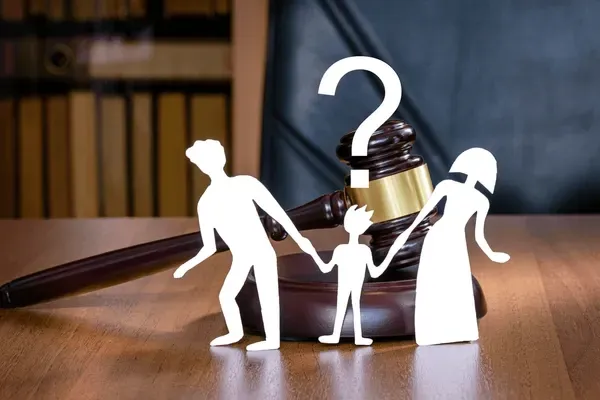Divorce and Disability In North Carolina: What You Need to Know
Filling for a Divorce When You or Your Spouse are Disabled

It is devastating to learn that studies have linked the onset of a disability to an increase in divorce rates. While future and financial planning are crucial for any marriage facing divorce, they become more complicated when a handicap is present.
How will a divorce affect a person's disability benefits? What happens if they used to rely on a spouse for help? Where to even start answering these questions when there are so many complexities?
What Is Considered a Disability?
Perhaps the best place to start is by defining disability. The term "disability" is specified under the Americans with Disabilities Act (ADA) as a legal term rather than a medical one. Because of that, the ADA describes disability differently from other statutes, such as for Social Security Disability benefits.
According to the ADA, a disabled person has a physical or mental impairment that significantly limits at least one major activity of daily living. This civil rights act makes discrimination based on a handicap illegal regarding work, transportation, public accommodations, and governmental access.
At the same time, Social Security offers a different definition of disability. According to this description, disability is an inability to participate in any kind of substantial gainful activity (SGA) as a result of a mental or physical impairment that can be medically determined. The impairment must have lasted or is predicted to stay for a minimum of twelve months or end in death.
Therefore, a wide variety of impairments people experience can fall under the umbrella word "disability." During a divorce, a judge would demand a detailed evaluation of the handicap developed before or during the marriage.
Disability and Divorce
When a spouse divorces but has never worked or is unable to work due to a handicap, there is typically a strong case for spousal support, which a judge can grant for a prolonged time. This financial help is otherwise known as alimony and can depend on how many months a marriage lasted.
If the non-disabled spouse has assisted or provided care for the disabled partner, it will impact the financial outcome of the divorce. That is because a disabled partner now needs to find a replacement for the ex-spouse's assistance for everyday tasks. That includes domestic chores, errands, doctor appointments, etc., which will have a significant financial impact and, in turn, increase spousal support.
Parenting Rights
An individual has to be mentally capable to be a parent. For this reason, if the handicap is serious enough, it can affect a parent's capacity to care for a child. For instance, a severe handicap may indicate that a parent lacks the mental capacity needed for such a task. Naturally, that could impact child custody.
In such a case, contacting an attorney as early as possible in the proceedings is advisable. That way, parents can ensure that the children's custody arrangement goes as smoothly as possible.
SSDI and SSI Benefits
A judge also takes into account whether a parent with a disability receives disability benefits, like SSDI or SSI. A person who has paid social security payroll taxes over the years is eligible for SSDI — Social Security Disability Insurance. SSDI is a federal program that receives funding from payroll taxes. It provides income supplements to those whose physical limitations prevent them from working.
While divorce will not impact SSDI eligibility or payment, a judge may decide to withhold SSDI funds to cover child support obligations. That means a judge takes SSDI into account while determining child support.
On the other hand, a disabled individual who has never worked or hasn't put in enough hours to qualify for SSDI may be eligible for SSI (Supplemental Security Income). SSI benefits do not count as income and, therefore, cannot be withheld. On the contrary — payments might increase after a divorce because SSI is a need-based help.
It is important to note that social security benefits cannot be distributed as marital property. Similarly, VA payments don't count as marital property when dividing assets.
Children With Disability
Any child with physical or mental impairments can also get SSI. Children and their needs play a significant role in the overall financial picture of divorce. That's why child support calculations should factor in specific requirements for children with disabilities.
What support networks and resources are recommended for individuals going through a divorce with a disabled spouse?
When navigating the complexities of a divorce involving a disabled spouse, it’s crucial to access the right support networks and resources. Engaging with community groups and organizations that focus on disability advocacy can be highly beneficial. These groups offer tailored advice and can help connect you with legal and social assistance specific to your needs.
Furthermore, consider joining therapy sessions or support groups. These settings provide a safe space to discuss your challenges and emotions, offering both professional guidance and peer support. Therapists who specialize in divorce and disability issues can be particularly helpful, providing strategies to manage the situation more effectively.
Additionally, online forums and social media groups can also serve as vital support resources. They allow you to share experiences and receive support from others who understand the unique challenges you’re facing. This network can be an invaluable source of encouragement and practical advice during this difficult time.
How might disability benefits be affected by a divorce involving a disabled spouse?
Divorce can significantly impact disability benefits, raising numerous complexities that need careful handling. A disabled spouse who receives benefits like Social Security Disability Insurance (SSDI) or Supplemental Security Income (SSI) might face alterations in their benefit status post-divorce. This change primarily depends on the nature of the benefits received and individual circumstances.
Understanding SSDI and SSI
SSDI: Typically based on the disabled person's work history and earnings.
SSI: Assesses income and provides benefits based on financial need.
How Divorce Affects Disability Benefits
1. SSDI: If a disabled spouse receives SSDI, divorce might not directly impact the benefits as SSDI is awarded based on the disabled individual's own work history.
2. SSI: Since SSI is determined by current income, a divorce could lead to changes in household income and potentially alter benefit amounts.
Legal Considerations
To navigate the intricacies of how divorce might modify disability benefits, it's crucial to seek legal advice. An experienced attorney can provide guidance tailored to specific situations, ensuring that rights are protected and financial stability is maintained. This legal support is essential in understanding pre-divorce agreements and their implications on disability benefits post-divorce.
Overall, the impact of divorce on disability benefits can be substantial, necessitating thorough preparation and expert legal assistance to manage effectively.
How can mediation help in a divorce involving a disabled spouse?
Understanding Mediation in Divorce Cases Involving a Disabled Spouse
Divorce can be a complex and emotional process, especially when one of the spouses has a disability. Mediation emerges as a supportive solution in such cases, offering multiple benefits that address the unique needs of the situation.
Facilitating Communication: One of the primary challenges in a divorce involving a disabled spouse is communication. Mediation provides a structured environment where both parties can express their needs and concerns in a respectful and understanding manner. A mediator, who acts as a neutral facilitator, ensures that the conversation remains productive and focused on solutions.
Tailoring Solutions: Every divorce has its own set of complexities, and the presence of a disability can add additional layers to the negotiation. Through mediation, solutions can be specifically tailored to accommodate the unique needs of the disabled spouse. Whether it’s arranging adequate financial support, or considering accessibility needs and caregiving arrangements, mediation allows for customized agreements that are mutually beneficial.
Reducing Conflict and Stress: The traditional divorce process can be adversarial and stressful, potentially exacerbating the challenges faced by a disabled individual. Mediation, by contrast, emphasizes cooperation and resolution. This approach not only reduces the emotional strain but also helps preserve a civil relationship between the parties. This is particularly vital when children are involved, or when the couple shares business or personal assets.
Mediation is a valuable tool in divorces involving a disabled spouse by promoting a calm, personalized, and respectful negotiating environment. This not only aids in reaching agreeable outcomes but also supports the ongoing well-being of both parties.
What are some solutions and support options available when divorcing a disabled spouse?
Understanding Solutions and Support in Divorce with a Disabled Spouse
Divorcing a disabled spouse involves unique considerations and challenges. It’s critical to approach the situation with care and informed support. Here are some key support options and solutions that can help both parties navigate the divorce process respectfully and effectively:
1. Mediation Services
Utilizing a mediator can be invaluable in divorce cases involving a disabled spouse. Mediators act as impartial facilitators who help both partners discuss their needs and work towards equitable solutions in a structured setting. This process often leads to outcomes that are agreeable to both parties without the emotional intensity of a court battle.
2. Specialized Legal Advice
It is essential to work with a divorce lawyer who has experience in cases involving disability. Such attorneys are well-versed in related legal rights and the nuances of asset division and alimony, ensuring that the settlement considers the long-term welfare of the disabled spouse. They can offer strategic advice tailored to protect both parties’ interests.
3. Understanding Disability Benefits
The impact of divorce on benefits such as Social Security Disability Insurance (SSDI) and Supplemental Security Income (SSI) must be carefully evaluated. Professional legal guidance is crucial here, as the rules governing these benefits are complex. A lawyer can explain how your divorce may alter these benefits and suggest ways to mitigate negative consequences.
4. Emotional and Practical Support
Reaching out to support networks that specialize in disability can provide both practical advice and emotional comfort. These might include local disability advocacy groups, online forums, and specialized therapists or counselors. Such resources can be a lifeline, offering support from individuals who understand the specific challenges faced during such transitions.
By considering these structured support options, individuals can approach the dissolution of a marriage involving a disabled spouse with a balanced, informed, and compassionate strategy. Each measure can significantly contribute to a fair and smooth process for both parties involved.
Final Thoughts
Divorce is often tough. But dealing with a disability can make it even more difficult for everyone concerned, especially the disabled party. For this reason, it would be best to seek assistance with these issues from an experienced lawyer.











